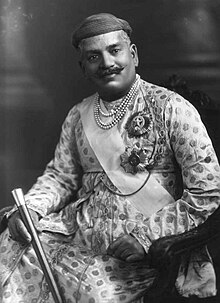
Back ماهاراجا Arabic Махараджа Byelorussian Махараджа Bulgarian Maharajà Catalan ماھاراجا CKB Mahárádža Czech Maharaja Danish Maharadscha German Μαχαραγιάς Greek Maharaĝo Esperanto
This article needs additional citations for verification. (November 2017) |
Maharaja[a] (also spelled Maharajah or Maharaj; lit. 'great ruler')[2] is a Hindu princely title ranked in honour below a Maharajadhiraja and above a Raja. The title referred to a prince during the modern period in India and in medieval northern India, but was equivalent to a 'King' in medieval southern India and in late ancient India.[3]
The form "Maharaj" (without "-a") indicates a separation of noble and religious offices, although since in Hindi the suffix -a is silent, the two titles are near homophones. Historically, the title "Maharaja" was first introduced in the first century BC by the Kushans as a higher ranking variant of "Raja".[3] Eventually, during the medieval era, the title "Maharaja" came to be used by sovereign princes and vassal princes, and the title "Maharajadhiraja" was used by sovereign kings. Eventually, during the Mughal and British eras, Maharajadhiraja too came to be used by princes, though it was used by sovereign kings as well, such as the King of Nepal.
The title ranks over the princely titles of Maharajadhiraja Bahadur, Maharajadhiraja and Maharaja Bahadur, equal to Maharana and Maharao and above Raja Bahadur, Raja and Rai.



- ^ "Maharaja". Oxford English Dictionary (Online ed.). Oxford University Press. (Subscription or participating institution membership required.)
- ^ Tej Ram Sharma (1989). A. Concept Publishing Company. ISBN 81-7022-251-6.
... Literally Maharaja means 'a great king' ...
- ^ a b "Maharaja | Hindu title". Encyclopædia Britannica. Retrieved 17 April 2021.
Cite error: There are <ref group=lower-alpha> tags or {{efn}} templates on this page, but the references will not show without a {{reflist|group=lower-alpha}} template or {{notelist}} template (see the help page).
© MMXXIII Rich X Search. We shall prevail. All rights reserved. Rich X Search